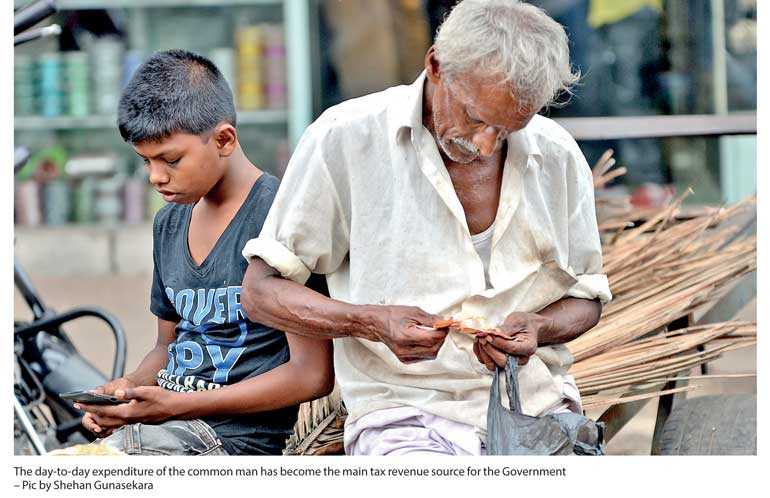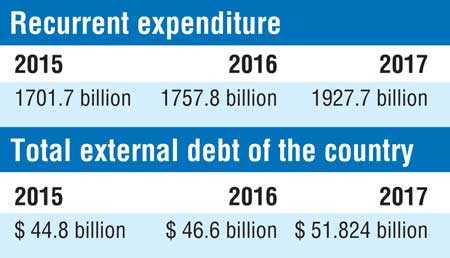Tuesday Mar 03, 2026
Tuesday Mar 03, 2026
Wednesday, 3 October 2018 00:00 - - {{hitsCtrl.values.hits}}

 A tailor is the best to stitch a patch in a torn cloth. He can apply himself professionally. There is a saying “a stitch in time saves nine”! But asking a dentist to do a cardiac surgery will not help. Closing the stable door after the horse has bolted may not help to resolve the despair!
A tailor is the best to stitch a patch in a torn cloth. He can apply himself professionally. There is a saying “a stitch in time saves nine”! But asking a dentist to do a cardiac surgery will not help. Closing the stable door after the horse has bolted may not help to resolve the despair!
Today we are experiencing a situation where the policymakers appear to be alarmed about the current financial scenario of the country. They are resorting to precautions probably with forethoughts of an impending financial crisis. But it is clear that the shape and the outflow of this manifestation are unclear to them. Because we do not see any conceivable measures taken or proposed to avoid such a disaster which is not unlikely.
A home-grown problem
The world has witnessed many shocking global financial calamities and their consequences. So far we have got involved in those as auxiliary victims only. But what is seemingly on the horizon today is unique being a home-grown problem as a result of complacency of our maestros managing the economy.
When we take a look back about our domestic set up, we can clearly see the contributions of two consecutive regimes responsible for what they have done to precipitate such a situation. The Rajapaksa regime no doubt left us with huge liabilities of the nature of an unbearable debt burden. The accumulated volume of foreign debts and their immediately serviceable interest and capital instalments due as repayments is their legacy. Foreign currency debt service payments and settlement of international foreign currency swap arrangements including the repayment of IMF/SBA facility has caused a decline in the official reserves. The previous regime has left behind a huge burden and the year 2015 recorded an overall deficit of $ 1,489 million in the BOP.
The new Government that came to power is 2015 while accusing the previous regime for their role in the deterioration of the country’s economy, adopted a laissez-faire policy obviously needed for their political endurance going beyond the wisdom of fidelity. The economic management aspect was taken over in its entirety by one segment of the Coalition Government and the ensuing structural changes that were associated with this move resulted in the abandonment of the other coalition partner in playing the much-needed joint role for the economic revival. On the one hand it appeared to be a show of no confidence on the coalition partner and on the other hand an acceptance of a challenge to restore the economic order come what may.
A gloomy picture
The hindsight view of the performance of the economy leaves us with a gloomy picture that falls far short of the declared expectations. The total foreign debt as well as the domestic borrowings have considerably increased adding to the grievance of unmanageable debt servicing. The recurrent expenditure is in the increase from 2015 onwards.
CBSL has reported that the total outstanding foreign debt, in particular the foreign commercial loans obtained recently, has caused a rise in the interest expenditure during the last year.
Compared to the previous year i.e. 2016 – Foreign interest payments have increased by 30.2% to an amount of Rs. 164.9 billion. The overall budget deficit was financed mostly through foreign sources during 2017. There is a significant increase of Government financing through commercial banks, and an amount of Rs. 375.7 billion has been borrowed during 2017.
There is an increase in the foreign debts during the last year by $ 5.4 billion. The total external debt of the country as a percentage of GDP increased to an all-time high value of 59.5% during the last year.
The worker remittances from migrant worker overseas were reduced considerably. It is claimed that this is partly due to the economic policies of the Government with regard to taxation, etc. and issues centred on political stability.
Taxpayers affected
The failures and poor performance of the economy is adversely affecting the taxpayers of the country. This effect is not so much on the direct taxpayer but the day-to-day expenditure of the common man has become the main tax revenue source for the Government. When we take a look at the direct and indirect tax revenues during the past three years we can see a clear picture. The share of the tax revenue in the total Government revenue is about 86.8% .The tax income of 82.3% accounts for indirect taxes where all common citizens have contributed to in 2015.
In 2017 the indirect tax component in total Government revenue increased to 83.6% out of the total tax revenue of the government which is 91.2% of the total revenue. These figures speak loud for the disastrous management of the economy where the Government is dependent on an over-increasing indirect tax burden on the people.
The drain of the foreign reserves of the Government was partly due to the amateurish handling of the economy by those responsible. The CBSL bond scam ruined the image of the country and severely damaged investor confidence. No one can deny that during the immediate aftermath there was a significant drain in foreign investments.
The US Dollar was constantly under a severe pressure due to these reasons. The inability of the Government to maintain a sound reserve balance is the main reason for the depreciation of the rupee vis-à-vis the US Dollar. In 2016 and 2017 the CBSL managed to control the depreciation effectively by intervening with the reserve. Due to the lopsided and capricious blow-hot and blow-cold economic policies, the Government has miserably failed to maintain a sustained growth and sufficient foreign reserves.
The truth of the matter is today we depend on loans, commercial as well as from international agencies, to run the economy on a day-to-day basis without defaulting the interest and capital repayments on account of their flimsy and wanton borrowings most of which have gone to finance their extravagant lustful expenditure, laden with waste, corruption and misuse.
Banking sector’s role
After the 9/11 terrorist attack in the US in 2001 which marked the first global financial crisis, 10 years ago there came another shock. That was the collapse of Lehman Brothers, the US-based global financial services firm. They were the fourth largest investment bank in the US engaged in investment banking. They suddenly declared bankruptcy in 2008, causing shock waves across the world financial system. They were trading US Treasury securities and were in operation for over 150 years. When they filed their bankruptcy application they had $ 600,000,000 in assets.
Their bankruptcy triggered a drastic drop in the world share market operations causing chaos and havoc in 2008. They had highly paid executives in their pay books. They were holding as securities the major share in the property market. This event has proved that big or small they can collapse.
The lesson it gave was banking sector crashes can occur. There has to be a constant, vigilant watch. No financial crises can be pre-determined. But caution and maintenance of ethical conduct can reduce the effect of a crisis.
A closer examination will show how contributory a role the banking sector in the country has played towards our economic demise. Government complacency and their readiness to take recourse and seek refuge from the banking sector for their survival, leaving them to do what they are doing, will lead to another Lehman Brothers affair in Sri Lanka.
Time to
change course
The doings of the Trump administration no doubt has caused many problems. But the Federal Reserve is yet to step in for the required counter moves and adjustments. Instead of trying to blame the US and Trump, our financial wizards who were very vociferous in announcing paradoxical plans should change course from their sardonic wishful journey to pave the way for sanity to prevail.
All these causes have contributed to the precarious situation we are faced with today. Most of our national goals remain as expectations yet to be fulfilled. Industrialisation remains a dream while production and import substitution is limited to rhetoric. Income inequality of society is growing. Dependency on foreign loans, grants and other inflows is increasing not only as a need for development but even for servicing the commitments on our ever-increasing heavy borrowings.
State-owned banks are becoming lenders of the last resort towards Government survival with hardly any credit supply to the real economy. Their balance sheets are swelling with accumulating asset values against the security of comfort letters issued by the Treasury. They earn profits from the Government and pay back a portion to the golden shareholder after utilising a major share for pocketing huge pay packets, perk and allowances by the executives with a massive drain of funds for wastage and corrupt deals. They are operating unmindful of any impending perils.
The political authorities when told get away by stating that the banks are operating under autonomy, hence they are not responsible. These institutions on the other hand carry on with least regard for accountability as if autonomy is something inherent and not granted, while those in authority have conveniently forgotten that it is they who have granted the license to autonomy.
We urge the policymakers to take a serious look at this and be mindful of the global lessons on how a country’s banking system and government are closely interlinked at times of crisis. Instead of pointing the finger towards Trump and US, it will be a prudent step to consider the realities. History is full of bank meltdowns, sinking and total collapses.
Oversight and intervention required
The depreciation of the currency against the dollar is only one factor. The guardian angels of our economy are trying to tell us about the degree of currency depreciations vis-à-vis the US Dollar in other countries. What they do not tell us is that all those countries are in a position to absorb the shocks with their domestic resources which they have carefully managed whereas we cannot do the same. The policymakers cannot act as mere onlookers. Where oversight and intervention is required, they cannot stand looking for scapegoats and go on accusing the former regime.
No one can predict how and when a crisis would strike. But we require measures to reduce the effects of such. Our future is not doomed – there are several plans for transforming the economy towards a knowledge-based, competitive social market economy.
Port City development and the Megapolis project are lights not too far away. The Megapolis Master Plan will be able to transform the Western Province into a “smart, vibrant and liveable area”. There are many development initiatives in the plan including transportation, housing, waste management, disaster mitigation which will support the overall growth of the economy. Fortunately a handful of persons are apparently working hard to make these hopes a reality beyond the vicious circles hell bent to make money by any means. We wish those do-gooders all success.